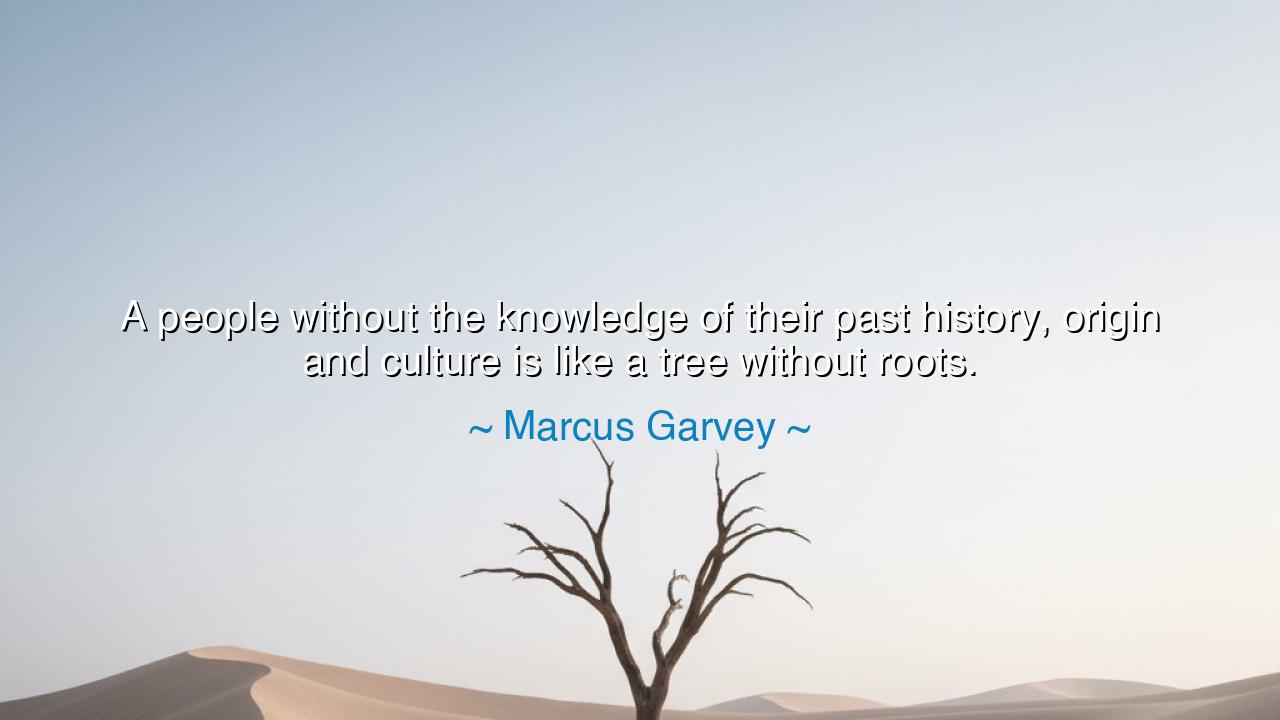
A people without the knowledge of their past history, origin and
A people without the knowledge of their past history, origin and culture is like a tree without roots.






“A people without the knowledge of their past history, origin and culture is like a tree without roots.” Thus spoke Marcus Garvey, the prophet of Pan-African pride, the herald of liberation for those whose identity had been torn from them by chains and exile. In these words lies a truth as ancient as the soil and as enduring as the human spirit: that memory is the sustenance of the soul, and without it, a people wither and fall. Garvey’s voice, rising from the early 20th century, was more than a cry for remembrance — it was a command to awaken, to reclaim the stories that had been stolen, and to stand upright once again as heirs to a noble lineage.
Garvey, born in Jamaica in 1887, spoke at a time when much of the African world lay under the shadow of colonial rule, its children scattered by slavery and stripped of their sense of belonging. He saw that oppression was not maintained by the whip alone, but by the erasure of history. If you make a people forget who they are, they will never know what they might become. Thus, he founded the Universal Negro Improvement Association, and through it, he sought to replant the uprooted — to remind Black men and women across the world that their story did not begin in bondage, but in civilizations of greatness, in kingdoms that stood long before Europe awoke from its slumber. His words were an act of re-rooting: a return to the fertile soil of cultural pride and ancestral strength.
To be a tree without roots is to stand fragile before every storm. When the winds of adversity come, when falsehood and shame beat upon the branches, the tree falls because it has nothing to hold it to the earth. But when the roots are deep — when a people know their history, origin, and culture — they cannot be moved. They draw life from their past, nourishment from their heritage, and strength from their ancestors. History becomes not a burden, but a foundation; not a chain, but a root system that feeds resilience and renewal. Garvey understood that the soul of a people, like a tree, cannot live by leaves alone — it must draw its essence from the hidden depths of time.
This truth is seen throughout the ages. When the Jews were scattered from their homeland, they preserved their identity through memory — through the songs, rituals, and stories that kept alive their covenant with God. For two thousand years they wandered, yet they never forgot Jerusalem, and so their culture endured. Likewise, after the fall of Greece and Rome, their writings and philosophies became the roots from which Western civilization grew anew. But where memory is lost, nations crumble. The great civilizations of Africa, of the Americas, of the Pacific — so many fell silent not because their wisdom was lesser, but because colonizers cut their roots, and their descendants were taught to despise their own names.
Garvey’s wisdom, then, is not confined to one people or one age — it is the eternal law of humanity: to forget is to perish. Every people, every individual, must tend to their roots, lest they live as strangers in their own land. This is why elders tell stories by the fire, why sacred songs are sung, why monuments are built and languages preserved. It is not mere sentiment — it is survival. Without memory, we are adrift; without roots, we are dust carried by the wind. The knowledge of who we are, where we came from, and what we have endured gives us power — the power to shape the future instead of being shaped by it.
And yet, Garvey’s teaching is not a call to dwell only in the past. He warns that roots exist not to imprison the tree, but to sustain its growth. To know your history is not to remain in it, but to draw from it the strength to rise higher. The past is a guidepost, not a grave. The wise man looks backward only to move forward with clarity. A nation that honors its ancestors but fears the future is like a tree that clings to its roots but refuses to bear fruit. True pride in heritage must inspire progress — art, education, justice, unity — the living expression of history renewed.
So, my children, take this teaching to heart: seek your roots, both as individuals and as a people. Learn the stories of your ancestors, speak the names that the world tried to silence, study the paths they walked and the songs they sang. Do not let your history be told only by those who profited from your forgetfulness. Reclaim it. Write it anew. Teach it to your children, so that they will stand firm when the storms of ignorance and hatred come. For when your roots are deep, no wind can topple you.
And remember this above all: heritage is strength, memory is freedom, and culture is immortality. Marcus Garvey’s words are not merely for those who have been displaced — they are for all who seek to live with purpose. Know your roots, and you will know your power. Guard your history, and you will guard your soul. For a tree without roots may look alive for a time, but only the rooted one endures through every season — growing, flowering, and giving life to generations yet unborn.






AAdministratorAdministrator
Welcome, honored guests. Please leave a comment, we will respond soon